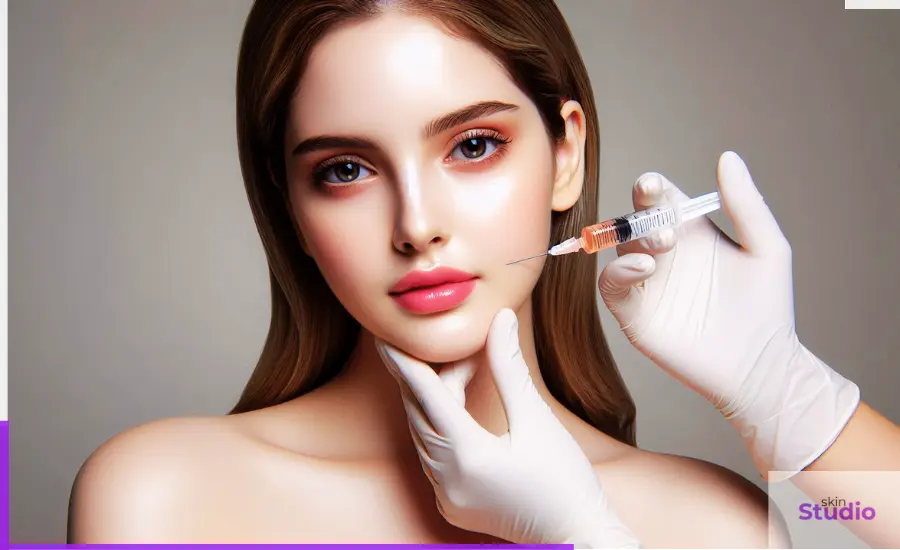Glutathione injections, often referred to as the “mother of all antioxidants,” have gained popularity due to the increasing demand for quick skin whitening solutions. With advancements in cosmetology, various molecular treatments for skin pigmentation have emerged. However, the safety of glutathione injections remains a topic of debate. This article explores the facts versus fiction regarding glutathione injections, including their cost, benefits, and potential side effects.
Understanding Glutathione and its Types

Glutathione is a naturally occurring antioxidant composed of three amino acids: cysteine, glycine, and glutamic acid. It plays a crucial role in eliminating free radicals from the body, which can result from sun exposure, pollution, drugs, and other lifestyle factors. Glutathione helps slow the aging process by reducing cell division and maintaining overall health.
Glutathione also detoxifies chemicals and toxins, reduces melanin production, and improves skin color and tone. There are three primary methods to introduce glutathione into the body:
- Injectables: administered intravenously (IV drips) or intramuscularly (IMs), ensuring rapid and effective absorption.
- Oral Form: Available as capsules, tablets, or liquids, often combined with other antioxidants for ease of use.
- Topical Form: Includes creams, lotions, gels, and face washes, although less effectively absorbed than the other forms.
The Glutathione Injection Procedure
A drip administers glutathione injections intravenously, acting as a potent antioxidant that reduces free radicals in the body. They may also promote the production of pheomelanin, a reddish-yellow pigment, resulting in brighter skin. However, the effectiveness of glutathione injections for skin whitening is inconsistent.
The mechanism of glutathione injections for skin whitening is being discussed.
Glutathione injections protect the skin from harmful UV rays, preventing tanning and pigmentation. They inhibit the enzyme tyrosinase, which is involved in melanin synthesis, thereby lightening the skin tone by reducing melanin production.
Cost of Glutathione Injections in Pakistan
The cost of glutathione injections in Pakistan ranges from PKR 13,000 to PKR 25,000 per injection. Various factors influence the overall cost, including dosage, number of injections, target area size, and maintenance doses.
Factors Affecting Glutathione Injection Prices
- Dosage Requirements: Higher dosages increase the price.
- Glutathione Quality: Premium-quality glutathione from reputable companies is more expensive.
- Number of Injections: For sustained results, multiple injections are required, which affects the total cost.
- Maintenance Dosage: Additional maintenance doses or oral supplements impact the price.
- Additional Ingredients: Combining glutathione with other antioxidants like Vitamin C raises the cost.
- Location: Urban clinics with easy accessibility charge a higher fee.
- Clinic Reputation: Clinics with experienced dermatologists and high standards may charge premium prices.
The Benefits of Glutathione Injections
- Skin whitening: It lightens skin tone and removes spots for a brighter complexion, with varying results for different individuals.
- Anti-Aging: Delays signs of aging, keeping the skin smooth and wrinkle-free.
- Acne and Blemish Reduction: Reduces melanin production and inflammation, helping with acne and blemishes.
- Strong antioxidants remove harmful free radicals, combating dark spots, fine lines, and wrinkles.
- Improves Elasticity: Boosts collagen and elastin production, reducing fine lines and wrinkles.
- Detoxification: Flushes toxins from the blood.
- Anti-inflammatory agents reduce inflammation and protect cells from damage.
- Immunity Boost: Enhances immunity, aiding in the fight against skin diseases like acne and dermatitis.
Potential Side Effects of Glutathione Injections
Despite their popularity, glutathione injections are not FDA-approved due to potential side effects and a lack of sufficient scientific data. Possible side effects include:
- Nausea and diarrhoea
- Skin rashes, hives, or allergic reactions
- Hair loss
- Difficulty breathing
- Chest pain
- Weight gain
- Greying hair
- Stevens-Johnson syndrome
- Toxic epidermal necrolysis.
- Breast pain
- Numbness
- Eye disorders
- Aggravated asthma symptoms
High doses can also affect the liver and kidneys, and adding vitamin C may cause kidney stones or necessitate hemodialysis in G6PD-deficient individuals.
Using Glutathione Injections for Skin Whitening

Only after a thorough consultation with a dermatologist can you use glutathione injections under medical supervision. They can assess your concerns, determine the appropriate dosage, inform you about potential side effects, and monitor for adverse reactions. Typically administered once or twice a week, these injections may require maintenance sessions.
The facts about glutathione injections for skin whitening are as follows.
Despite their widespread use, the US FDA has not yet approved glutathione injections, and researchers are still studying their safety and efficacy. Risks often outweigh the benefits, with results varying from significant skin lightening to no improvement. The effects are also temporary, disappearing once the treatment stops.
USFDA-approved skin-whitening treatments
In Pakistan, there are safe and effective skin whitening treatments available.
- Chemical Peels: Plant-based chemical solutions cause controlled exfoliation, treating blemishes, tanning, dullness, and acne marks.
- Laser Toning: Q-switched Nd:YAG laser technology reduces melanin buildup in deeper skin layers, offering results without downtime.
Consulting a qualified dermatologist is crucial to making an informed decision and choosing the safest and most effective treatment for skin whitening.
FAQS
How Many Injections of Glutathione Are Required for Skin Whitening?
Glutathione injections are a popular method for those seeking skin-whitening solutions. Dermatologists generally recommend a dosage of 600–1200 mg per injection, administered intravenously, one to three times a week. Typically, you must undergo this treatment for 6–8 weeks to observe significant results.
The effectiveness of glutathione injections for skin whitening is being evaluated.
Glutathione injections can temporarily brighten skin for some individuals if taken consistently over a few weeks or months. However, the effectiveness varies from person to person, and the whitening effect diminishes once the treatment stops.
Choosing the Appropriate Amount for Glutathione Injections
The number of glutathione injections required for skin whitening varies depending on individual skin types and the reasons for skin darkening. On average, it is common to start with one to three injections per week. Consulting with a dermatologist is essential to determining the precise number and frequency of injections needed for your specific condition.
The timeline for achieving visible results with glutathione injections is now available.
Results from glutathione injections usually become visible after a minimum of 6–8 weeks. The duration can extend depending on the individual’s skin type, the extent of skin concerns, and any additional health issues.
Glutathione Injections Provide Permanent Skin Lightening.
Glutathione injections do not provide permanent skin whitening. Maintenance injections are necessary to sustain long-term benefits.
Duration of Glutathione Injection Effects
Glutathione injections have a skin-lightening effect that lasts as long as the treatment continues. Stopping the injections will result in a gradual return to your original skin tone.
Safety Precautions for Glutathione Injections
Administering glutathione injections at home is not advisable due to potential severe side effects such as breathing difficulties, blood pressure fluctuations, and drug reactions. These side effects require management by a qualified doctor, making it crucial to receive injections under strict medical supervision.
Discontinuing Glutathione Injections: Consequences
Ceasing all forms of glutathione intake will lead to a loss of its skin-whitening effects, gradually restoring your natural skin tone.
Glutathione Injections: Safety and Side Effects
Glutathione injections have been known to cause some side effects, including drug allergies, chest pain, and skin rashes, but long-term safety is still unknown. Side effects are unpredictable; some individuals may experience them, while others may not.
Recommended Glutathione Injection Dosage
Dermatologists typically recommend a glutathione dosage of 600–1200 mg per injection via the IV route. The exact quantity, however, varies for each person.
Pre-Care Instructions for Glutathione Injections
There are no specific pre-care instructions for glutathione injections. We generally advise following a proper skincare regimen and using regular sunscreen for sun protection.
Post-Care Instructions for Glutathione Injections
After the injection session, the medical team usually applies an ice compress to the injection site for 10–20 minutes. If mild headaches occur, the doctor may prescribe painkillers like paracetamol. You can resume your daily activities post-injection.



